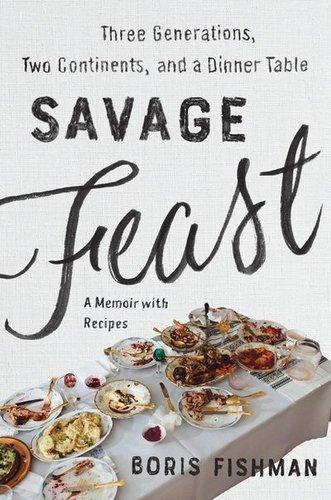SAVAGE FEAST
Three Generations, Two Continents and a Dinner Table (A Memoir With Recipes)
By Boris Fishman
We should all be so lucky as to cook for Boris Fishman’s grandfather, a macher with a liquor cabinet full of excellent cognac and a jovial disregard for the dietary restrictions recommended by the agency that assigned him Oksana, his home health aide. Oksana is the hub of “Savage Feast,” Fishman’s memoir of food, family and identity. “Her tables were the sublime distraction that allowed the old, well-grooved grievances to occasionally make room for something else.”
Having immigrated to America from Minsk in 1988 at the age of 9, Fishman feels the tension of being a liminal immigrant. He envies “people with generations behind them in America — all that compound achievement.” But he also keeps his sense of otherness sharply tuned: He wants it both ways. Fishman would like to pass for native, to become wholly American, but he can’t resist foreign habits, like bringing delicious tin-foil-wrapped treats to eat on a plane: “Pieces of lightly fried whiting. Chicken schnitzels in an egg batter. Tomatoes, which I ate like apples. Fried cauliflower. Pickled garlic. Marinated peppers, though these could be leaky. Sliced lox. Salami.”

Oh, Fishman is hungry. Don’t doubt it for a second. At a Passover Seder, overwhelmed by cognac and Oksana’s tsimmes, he recalls a piece of advice he once read: that to achieve “moderation in alcohol” one should drink only when hungry. “But I couldn’t stop being hungry. If I could pause for 10 minutes, perhaps my brain would catch up to my stomach, but I couldn’t manage to pause for that long.” Fishman eats as his family eats: “You come,” he tells himself, “from a people who eat.”
On the train from Minsk, when Fishman was a child, the family was roused in the predawn hours and asked to provide their documentation. “If you want a shortcut to the Eastern European experience,” he observes, “you must have yourself woken from the sarcophagus of a sleeper’s ceiling berth by border guards in the night.” Afterward, shaken by the experience, “out came rolls of salt cured salami, a basket of hard-boiled eggs, a block of hard cheese, towel-wrapped cucumbers, tins of sprats, sardines, cod liver and salmon. And a loaf of dark sourdough Borodinsky rye, sweetened with molasses, made with coriander seeds, finished with caraway.”
Enthusiastic meals — not all of them in transit — are the language of this book, the waypoints and transitions, the narrative beats and instigative sparks that drive the storytelling. The meals are fantastic. Of course, they tend to sharpen that which Fishman claims to want to dull: One can bring only so much pickled garlic onto the airplane before people start to stare. “With the extra peripheral vision that is a kind of evolutionary adaptation for refugees, persecuted people and immigrants, I would sense, on the plane, the sideways glances of savage, disturbed curiosity.”
Rebuke — perceived or real — seems to surround Fishman and eventually overwhelms him. Tales of his family yield to accounts of his own inability to find personal and professional equilibrium, and we watch him dig his way out of a deep depression by (of course) learning to cook. He goes to work on a farm, organizes a meal for a camp full of children, and interns at a restaurant full of entertainingly sullen Russian line cooks.
Many of the best parts of this book will be familiar to readers of Fishman’s work; indeed, “Savage Feast” feels at times like a key to his novel “A Replacement Life,” which involved the creation of fraudulent Holocaust restitution stories — in other words, telling stories about your family. But here there’s a more straightforward desire for connection and a much less postmodern quest to find someone to eat with. “Two people eating in famished, silent synchrony — what more did you need?”



